We find the Phoenix closer to Ancient Secrets than the other six clans. The followers of Shiba find themselves isolated from the Empire, but also isolated from the other expeditions. Settled in the Empty City, with the Barren Swamps on the west and the Misty Plains to the east, the Phoenix stand in solitude. To keep them some company, we also reveal the Neutral cards. There are 15 Neutral cards in Ancient Secrets, so brew some tea because this is going to be a long one. And next week we get the final 17 cards and the release of Ancient Secrets!
A Shared Land
In the design team we noticed that sometimes players disregard Neutral cards, treating them with a degree of disdain. We believe that is a mistake. Neutral cards form the backbone of the game. They establish not only the baseline for common abilities, but they also set important thresholds on how the game is played. The ruleset of the game sets the base framework for how the matches are played, but the Neutral cards are what set the first layer of the metagame as they establish invisible lines that guide how the larger game unfolds. Most Neutral cards in Ancient Secrets exist in that zone. So let’s check what we have in our shared space.
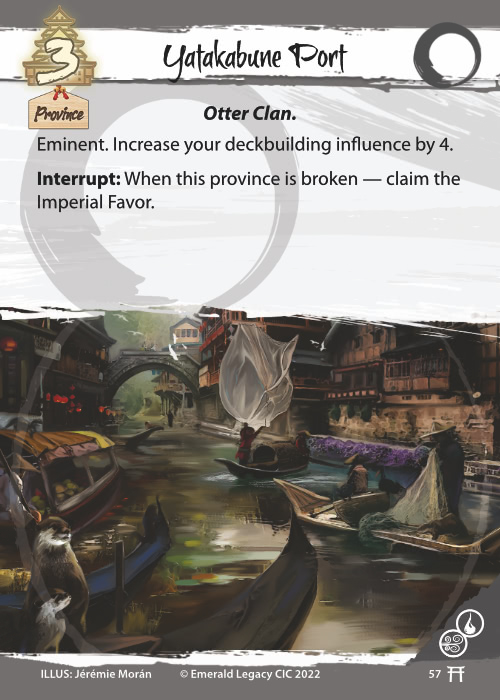
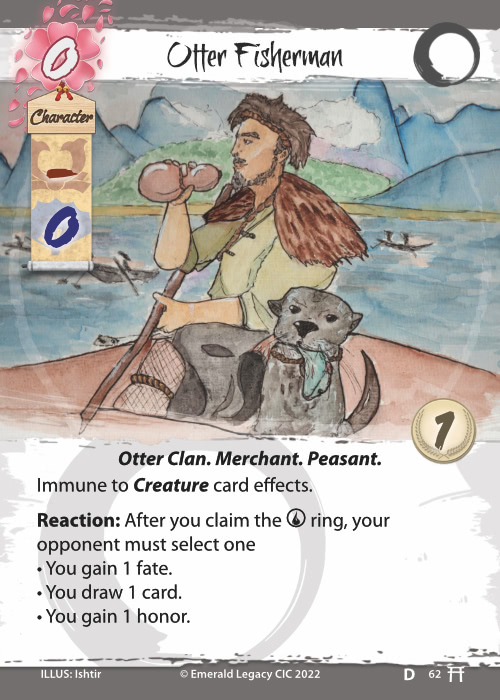
The Otter Clan settled in the area surrounding the river that separates the Misty Plains from the Fortune’s Fields. With some help from their neighbors in the Lion Clan, the Otter are hard at work building their home.
The Yatakabune Port is bustling with activity, drawing goods and visitors from all clans. The interchange generated by the mercantile activities is represented by the increase in Influence. The port exists as a minor clan possession — that status balances their weak defenses with the protection from Imperial mandates extending a degree of security to the minor clans.
The Otter Fisherman is a simple man, living on commerce and whatever resources he can find along the rivers. His ability displays his knowledge of living off the water, and his immunity to Creature effects can come useful in his adventures in the wild. Whales, Lions, Tengus? This fisherman has seen it all, and he is not shaken by any of them!
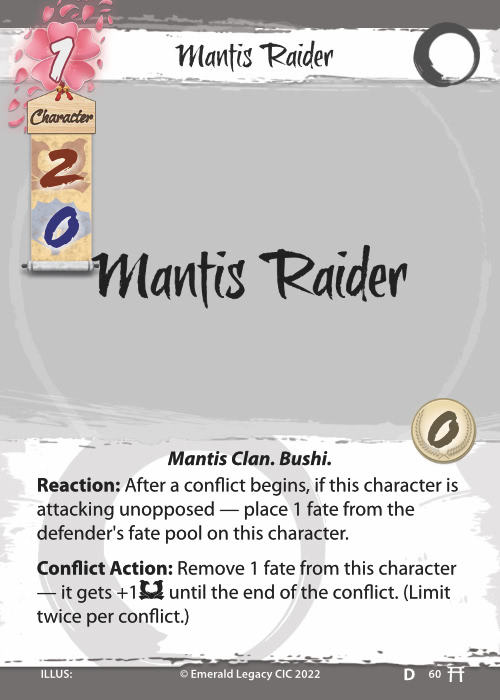
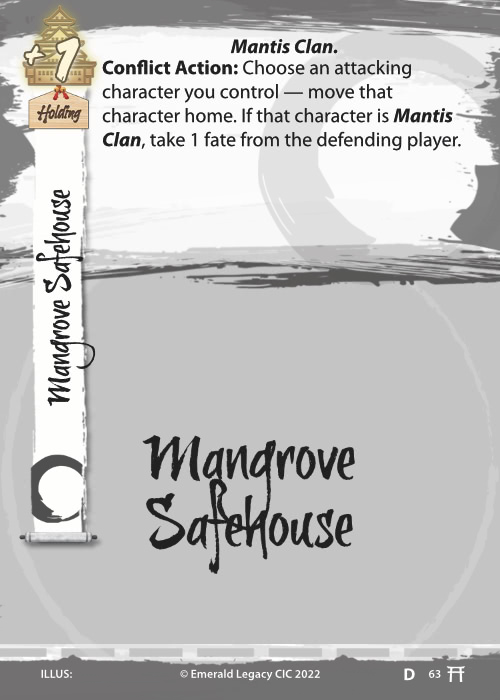
The Mantis Clan took the northern side of the Misty Plains. Located in the central area of Sanctuary, that key location will surely come in handy for the ambition of the Mantis. And if a new land calls for new methods, they are built on the traditions of the clan… even if those traditions can be a source of trouble.
The Mantis Raider is a threatening opponent. The adversary must protect their lands, else the Raider can easily plunder the resources available. And once the Raider is challenged, its fury is destructive. Emboldened by spoils of the past, the raider either takes what they want or destroys whoever stands on their way. The Mantis Raider is a cheap character fit for early game, who can still be seduced by riches to help during late game.
When the raid turns sour, the Mantis finds refuge in their Mangrove Safehouse. Hiding by the margin of the sea or one of the many rivers of Sanctuary, the Safehouse presents an opportunity for hit and run tactics. The Mantis specialize in such heists, but the Mangrove Safehouse can also protect wayward clan samurai in times of need.
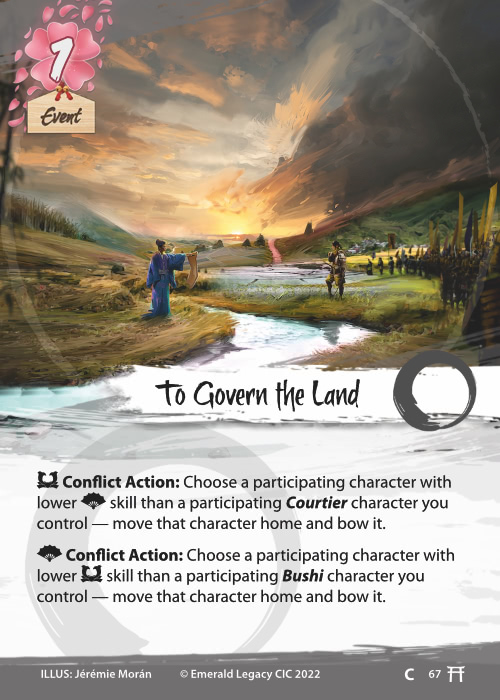
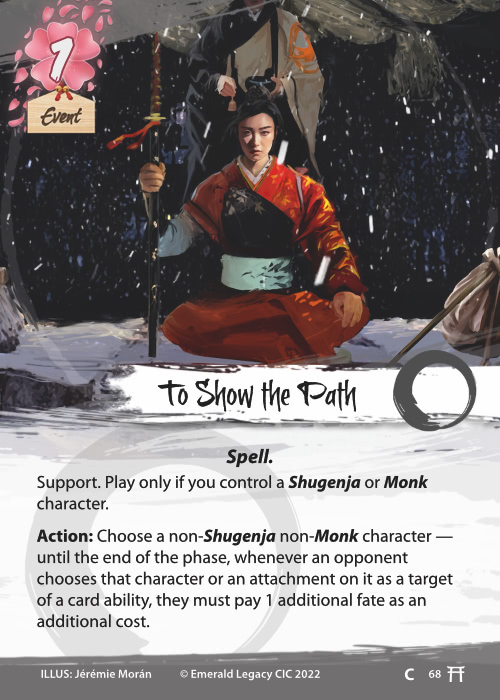
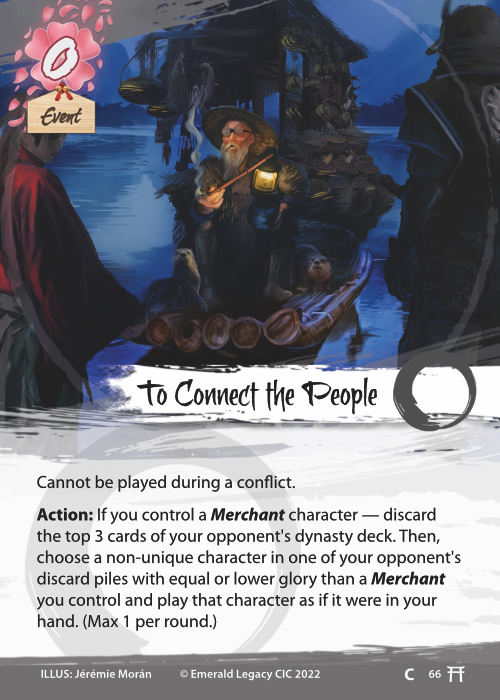
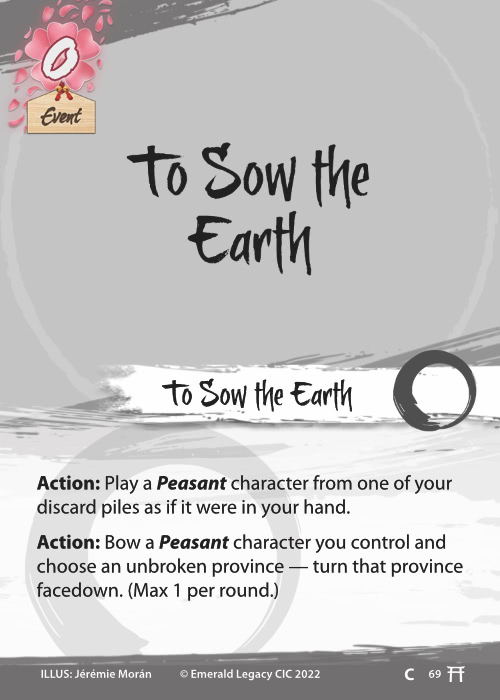
All castes of Rokugan are needed to build a new home in Sanctuary, each with their privileges and obligations. The four castes are represented in this cycle of events focused on the four main Traits of the mortal realm.
The duty of the Bushi and Courtier is To Govern the Land. In the feudal society of the Empire, warriors and politicians are intertwined in a complex web made of rulings and traditions, but also of mettle and strength. To Govern the Land represents this complicated balance where vast armies can be sent home by some centuries-old decree, but also where rightful court proceedings can be shut down by the threat of a unit of ruthless soldiers. This is a powerful event balanced by the opportunity cost of sending a mismatched character into the conflict: is it worth sending a Doji courtier into a battle to try and stop the fury of the Matsu? How much can this diplomat do, other than appealing to their right to Govern? Are their political skills going to be missed in a later political conflict? And what about the risks to their life stepping into that battlefield? Similar dilemmas are faced by a bushi being thrown into the political arena. Even considering this imbalance, To Govern the Land should become an important tool for balanced decks to face opponents who focus heavily into a single type of conflict, making it an escape valve to keep those strategies in check.
The duty of the Monk and Shugenja is To Show the Path. The spiritual castes serve the empire by bringing clarity to the other castes. They help find their way, appeasing the fortunes and blessing their days for good luck. While this event has the Spell trait to represent the mystical nature of the blessings extended by the shugenja, it lacks the Kiho trait as a monk’s guidance would not be categorized that way. The card ability extends protection to their target and all their current and future attachments. Note that the protective effect is active for the whole phase, and covers abilities from all sources. Due to its large scope, a well-timed To Show the Path can be game-defining. Last, this spiritual wisdom can also target an opponent’s character, which can prove decisive in certain matchups. The design of To Show the Path incorporates our approach of favoring the use of taxation in effects, instead of clear cancels: we believe that design direction keeps the game dynamic, and highlights the importance of player skill. Knowing when to pay a tax and when to conserve resources is a key aspect of growing as a player in L5R.
The duty of the Merchant is To Connect the People. The merchant trait is uncommon, but their importance for the Empire cannot be overstated. The merchants are the lifeblood of society, and it is through their talents that the clans form a single unit. War and disputes are detrimental to business, so this event cannot be played during a conflict. But in-between conflicts, a merchant can be put to work finding unlikely alliances as the players hire characters from each other. The character bought by To Connect the People follows all the common rules of playing a character, their costs must be paid, and they can receive additional fate if they are wanted for multiple rounds. The design of To Connect the People follows a pattern of allowing the player to play a card, instead of directly putting it in play. This pattern makes the abilities easier to scale, as their costs will follow the cost of whatever is targeted, reducing the potential for trouble as the card pool develops.
The duty of the Peasant is To Sow the Earth. The peasants sustain the empire, and without them nothing would be possible. They feed the courts, and they support the armies. The first ability of this event represents the ubiquity of the peasants, how they can be found at any place and put to good work in service to their samurai lords. The second ability is their power to bring life to the land and improve its capacity by allowing “on reveal” provinces to trigger again. It also reflects their skill in restoring their domains after damage: once a province is turned facedown all tokens are removed from it except taint tokens. This restorative work can bring a second life to cards like Public Forum, and can also restore provinces that have been blanked by dishonor tokens from cards like Meticulous Scout or Return from Shadows.
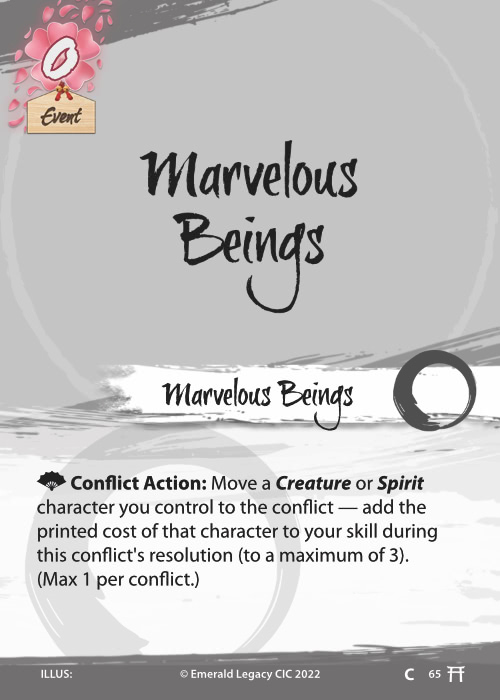
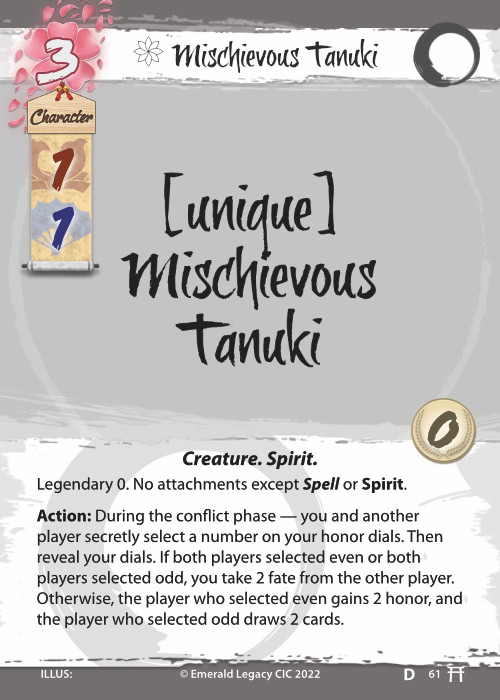
Sanctuary is a land filled with mysterious creatures and spirits. An environment full of wonder and danger, and also unexpected challenges. Annoyances or opportunities? That is for our heroes to discover.
Marvelous Beings completes the set initiated by the four previous cards. As the seven clans explore Sanctuary they will come into contact with fascinating creatures and spirits. Once brought for display to a court, their peculiarities are sure to garner attention and respect from all the assembled guests. Marvelous Beings adds its bonus skill directly to the player’s side in the conflict, not to any character in particular. It operates similarly to the Imperial Favor, as long as that player has a participating character they can count on that skill bonus during conflict resolution. That reduces the potential for combos with other abilities like duels, but it also makes the effect of the event resilient and versatile.
On the unexpected side, the clans might be visited by the Mischievous Tanuki. Native to the area of the Misty Plains, the Tanuki can be found exploring all regions of Sanctuary. This trickster spirit is always looking for victims for their pranks. It comes with Legendary 0, which means it can only enter play during the dynasty phase being played from a province, without any additional fate. It also cannot be put into play or be kept in play by any effects. The visit of the Tanuki is brief, but it is impactful. Granted, the result of their pranks is unknown, depending on mind games between players. A host deck prepared for their visit will be able to capitalize on whatever trick the spirit decides to pull that day.
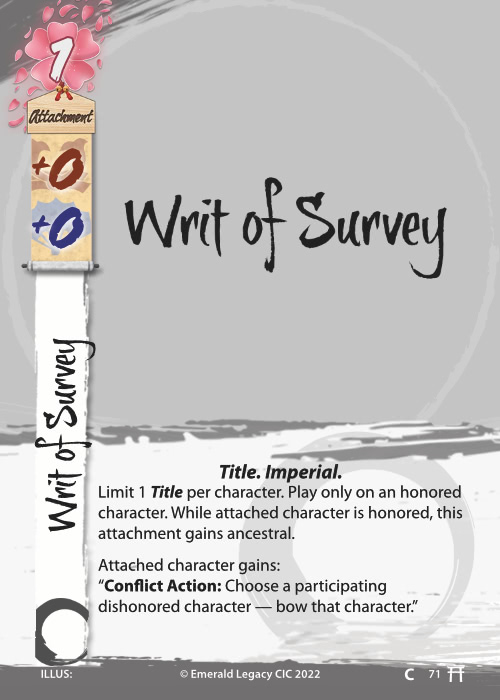
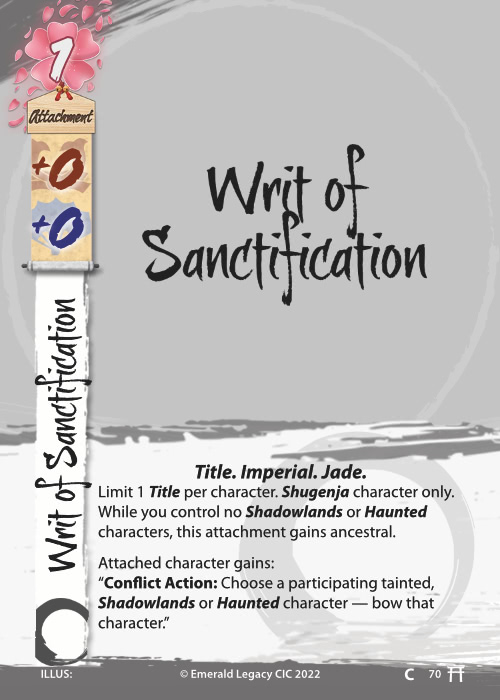
In Ancient Secrets we introduce Titles. A title is a type of attachment. Each character can hold a single title at a time. Each title comes with a few conditions for its holder, and some additional conditions to enable its Ancestral keyword. Besides those, each title empowers their holders with new abilities.
The Writ of Survey is bestowed upon a respectable character and gives limited authority over the land, letting them enforce the law as they see fit. To receive this title the holder must be honored at the moment of their investiture. Later, they can become ordinary, or even dishonored – the title stays. This is a special case, as titles usually require their conditions to be constantly fulfilled. However, if the holder falls from grace the Ancestral quality of the title is lost. For all their trouble, the holder of a Writ of Survey can bow any dishonored character in their presence.
The Writ of Sanctification is bestowed upon a shugenja and gives them the duty of sanctifying the land, cleansing it of impurity and keeping it safe from evil spirits. This title retains its Ancestral quality as long as its holder does not get mixed up with Shadowlands or Haunted characters. It is true that mingling with the shadowlands is usually a choice on the player’s side, but any player is under risk of being haunted against their will, as the next card will show. Last, to help their duty, those invested with the Writ of Sanctification can bow any Shadowlands, Haunted, or tainted character in their presence.
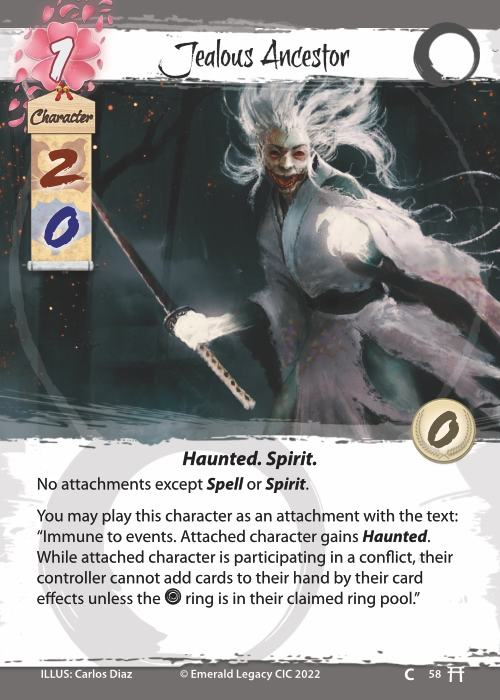
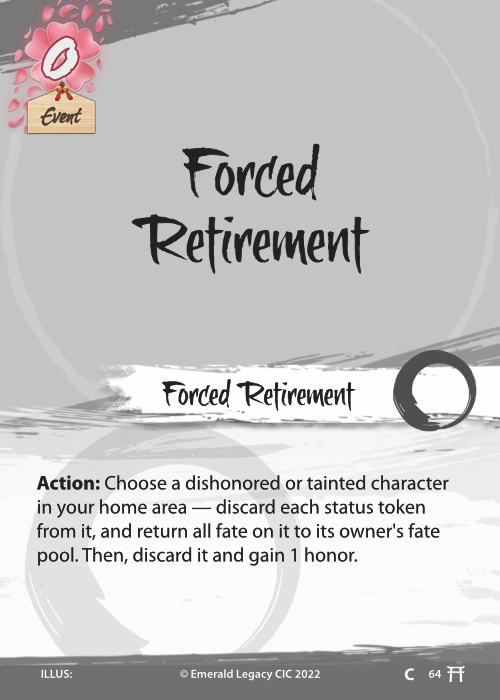
The sins of the past often come back to weigh on the heroes of today. The last 3 cards are designed with a clear goal of providing safety valves to the metagame – they deliver strong counterplay to players who feel too pressured by their meta.
The Jealous Ancestor comes back from the afterlife, and attaches themself to an unfortunate samurai. This haunted spirit is a curse, constantly harassing their victim with intrusive thoughts and inappropriate whispers. The persistent blabbering drains vitality from their host, making them tired and less capable. The Jealous Ancestor is a tool to fight back against the generators of card advantage used by the opponent. It is particularly efficient against characters who draw cards directly, but even when the card advantage is found in holdings or events the Ancestor can be effective when played during the conflict, locking down the draw effects for the whole battle. It is not easy to get rid of the Ancestor as it gains immunity to events once attached to their host. But if you find yourself haunted by this spirit, do not despair. It can be temporarily pacified with the proper rites by claiming the ring of Void. Just pay attention though, for those charged with a Writ of Sanctification might decide to chase you down.
For the samurai who finds themself in disgrace or tainted by the shadowlands, they can find solace in Forced Retirement. This event allows their controller to recover a part of the investment put into those characters, then alleviates the honor loss caused by dishonor and taint in exchange for discarding that character. Granted it is a high price to pay, but for strategies vulnerable to dishonor, Forced Retirement can be the difference between victory and defeat.
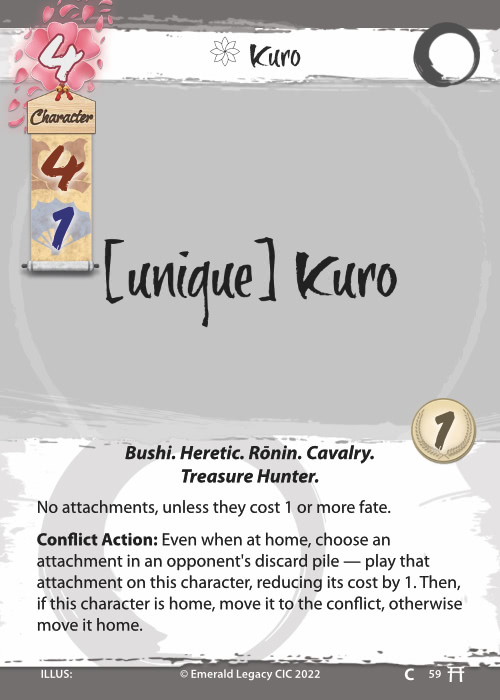
Our last Neutral card is Kuro. He is a ronin and a heretic, but above all a lover of freedom who devotes his life to the hunt for treasure and beauty.
Kuro values precious items, and disdains cheaper alternatives. As a treasure hunter he looks for riches in abandoned places, but also amidst all the valuables that the seven clans discard in their ignorance of what is truly precious. Always on the move, swift like the wind, Kuro will never be captured. At least that’s what he thinks.
This conflict character is a great choice for decks that lack good investments in their conflict cards. It can also make up for bad dynasty flips, rescuing rounds that would otherwise be lost.
Its ability is useful in almost all matchups, but it can be extraordinary against certain opponents. Kuro adds a degree of metagame balance around strong attachments. By being available to all clans, one must think a bit harder about what attachments to play. If they are too shiny, Kuro might take them.
They Who Dwell In Emptiness
The game design of Phoenix is marked by being deeply connected with the framework of the game, with abilities that build on ring effects, the sequencing of phases in a round, and interacting more with the game itself than with their opponents. It is also wrapped in and protected by indirection: it is often hard for the opponent to counterplay the Phoenix strategy as they are crushed not by direct effects, but by the game state being subtly altered in a way that the framework itself serves the needs of the Phoenix; likewise, the Phoenix can crumble when they find themselves in a position where changing the universe to hurt their enemies ends up being just as harsh on themselves. The new Phoenix cards stay true to those patterns, but as they meet the weird spirits of the Empty City the rules of reality can twist even further. We also introduce a few cards focused on Yojimbo – someone needs to protect the Isawa in this dangerous place.
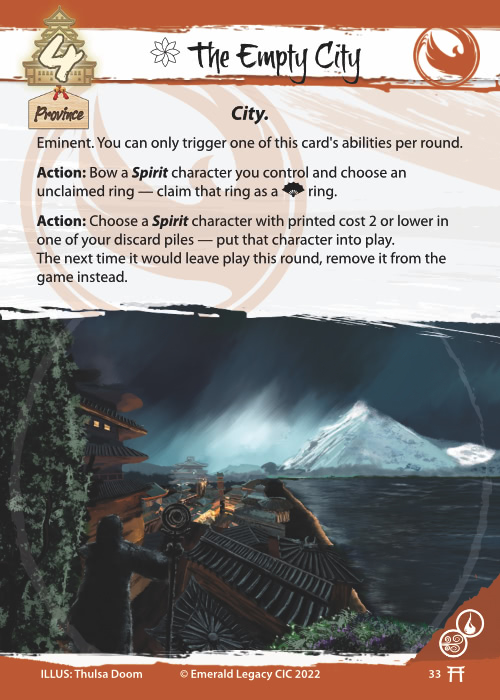
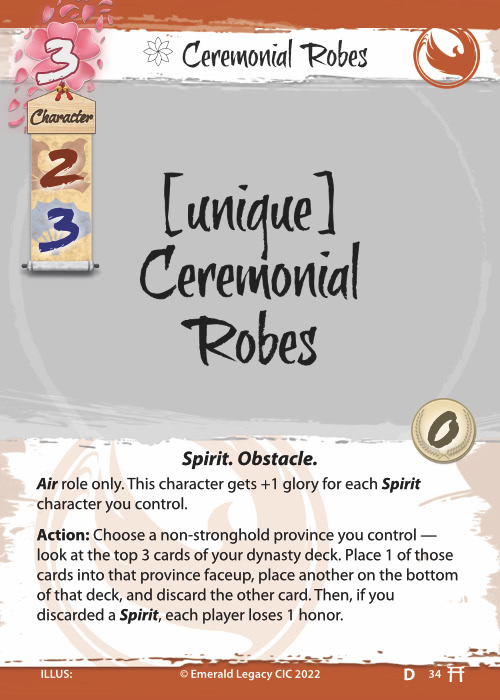
The Phoenix settled in the Empty City, a strange palace in the Five Rivers delta. The palace resembles a Rokugani construction but it is devoid of life… mortal life. The area is populated by a court of spirits in a conflict of their own. Fortunately if anyone is fit to broker peace between spiritual beings, it must be the Phoenix.
The Empty City is a powerful province, the seat of power in the area. It stands clear on the horizon, and starts the game faceup by being Eminent. It brings with it two powerful abilities that establish a foundation from where the Phoenix can explore Spirit-focused strategies. The first action employs a spirit as a channel to claim elemental powers, and with that claimed ring the Phoenix can power their own abilities while also preventing their opponents from attacking with that ring. The second ability invokes a spirit into the mortal realm and puts it in service to the Phoenix clan. Notice the invoked spirit can come from either the dynasty or the conflict discard pile. The Empty City might have two abilities, but only one of them can be used each round, as dictated by its special clause – it is a tool for versatility and not direct power.
The Ceremonial Robes rule the Empty City, with a firm grasp on the activities of the spiritual denizens of the palace. They might have 0 glory according to human standards, but their spiritual companions grant them respect, making the Robes all the more powerful when surrounded by their sycophants. As the controllers of the area, the Ceremonial Robes have the power to architect the city: they choose what holdings to build and where, they choose which characters are invited to join the court, and they also choose which cards are unfit and must be dispatched. Their preference for spirits over humans shows up in their fury when they’re forced to get rid of a friendly spirit. The Ceremonial Robes are versatile in their utility for the Phoenix game play; it can be used in dishonor strategies by discarding spirits, it can also be used in honor strategies by finding key cards like Guardian Dojo and Ancestral Shrine, and it can even empower conquest strategies that depend on specific characters in provinces or discard piles.
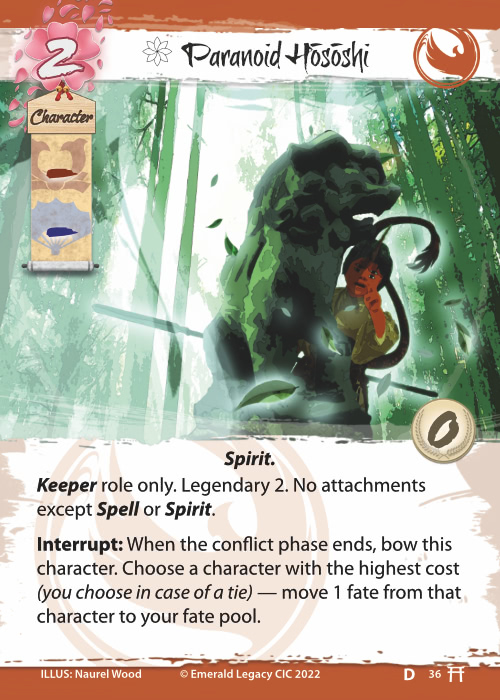
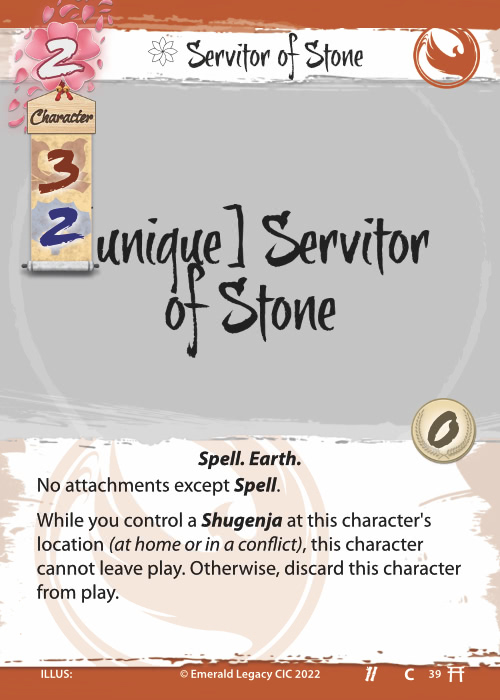
The Empty City has a host of spiritual denizens, each with their own personalities. The spirits are capricious beings, and interpret orders in twisted ways that the human mind would never expect. Other creatures can be raised by magic, but live under the control of humans. Obedient kami are dependant on the power of a Shugenja to manifest in the mortal realms.
The Paranoid Hōsōshi used to be protector of the Empty City, tasked with keeping the place safe from danger. But with the passing of time their mandate became unclear, the parameters for friend or foe turned uncertain, and now the Paranoid Hōsōshi will strike at anything that looks scary to their four eyes. The Spirit comes into play with Legendary 2: legendary is a keyword introduced by the Emerald Legacy in Through the Mists, it means the character comes into play with that number in additional fate; even with that advantage, Legendary is a negative keyword, because it also makes those characters unable to have any extra fate added to them — neither when bought, or by discarding duplicates, or any other effects. Legendary also makes it impossible to put that character into play by any other way, except buying them the normal way during Dynasty Phase. The Hōsōshi’s interrupt is a powerful ability that, round after round, strikes at the largest character in play. It sees no difference between friend or foe, making it tricky to manage if the Phoenix ever find themselves controlling the most expensive characters in play. The timing for the interrupt is also very precise, triggering at the same time as Shiba Tsukune, but it requires having the Hōsōshi in ready state as bowing it is a cost — this gives the opponent time to try to find a way around the Paranoid Hōsōshi.
The Servitor of Stone is a sturdy helper of the Phoenix clan, assisting them in building a home in Sanctuary. Invoked by a Shugenja, this character stays in play forever as long as the Phoenix player can keep it in the company of a Shugenja. When the Servitor of Stone finds itself in a conflict, they must have a Shugenja with them, and the same requirement exists once they’re back home. The Servitor of Stone can be a powerful tool for the clan, lasting many lifetimes, if the Phoenix are careful to keep it forever under their watch.
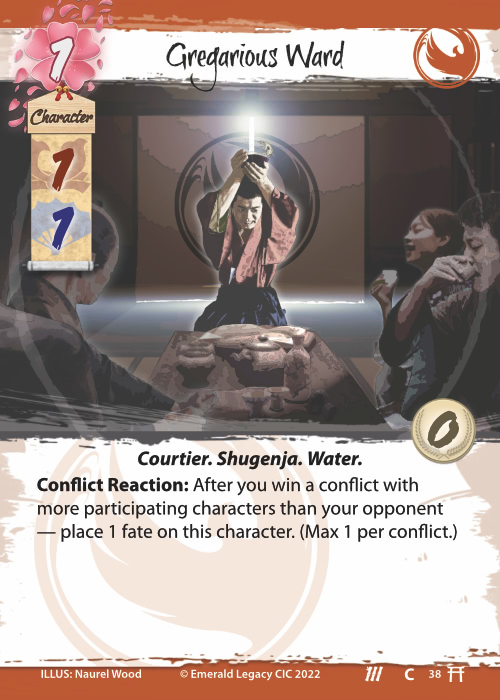
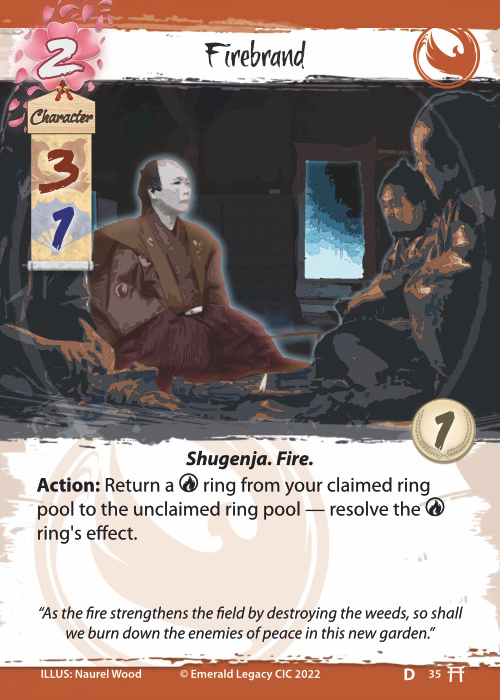
One of the highest duties of the Phoenix clan is the quest for harmony. The harmony of the five elements and of the ten spiritual realms, but also the harmony between castes and clans. This duty goes back to the early days of Shiba and Isawa, when they established a covenant between the heavenly kami and the godlike sorcerers of the Isawa tribe. That search for balance continues to this day, as each and every member of the Phoenix clan takes up their duty of harmony.
The Gregarious Ward is a young court shugenja who finds harmony in friendship and companionship. Their life gains meaning in sharing wisdom and laughs, as they build social ties that heal disagreements and build a tapestry of alliances. The character is a cheap conflict character that profits from winning conflicts in higher numbers. With a versatile combination of Courtier and Shugenja, the Gregarious Ward is a useful support character that fills a long-missing spot in the Phoenix cardpool.
The Firebrand is obstinate in building harmony at any cost. A rebel in service to tradition, this shugenja multiplies the fierce energy of fire, spreading honor or dishonor around. And when combined with Twin Soul Temple its abilities are intensified: turning any other element into fire, or using fire to make up for any missing element.
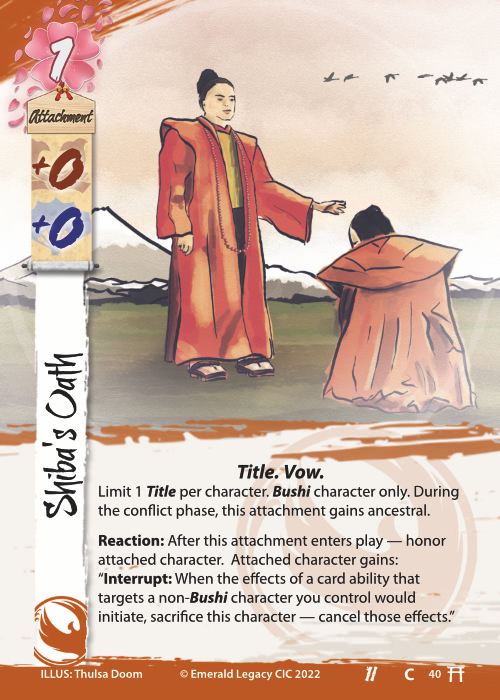
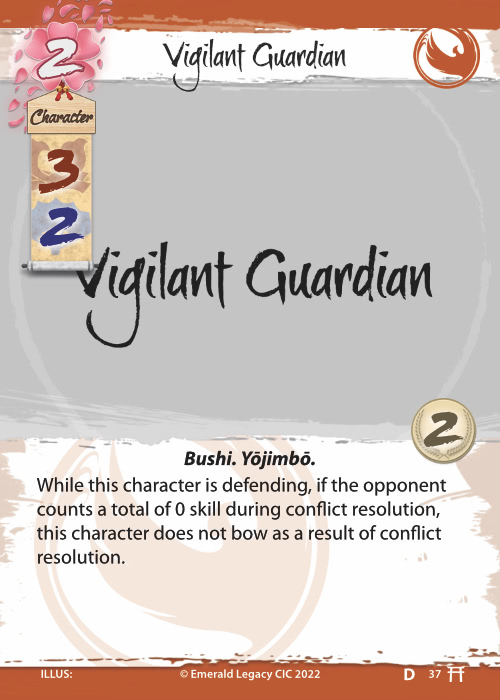
For the longest time the bushi of the Phoenix have been left on the backburner. Granted, most players are attracted to the Phoenix for their shugenja, but the clan also have other themes like their pacifist courtiers, their dedicated inquisitors, their mystical henshin, and the unfortunate souls who are seduced by mahō. All of those had some attention during the life of the LCG. But the bushi, even though they got a diverse selection of characters, never got enough pieces to form a deck focused on themselves. As Ancient Secrets is the last expansion before a new Core Set, we find it appropriate to bring a few extra pieces to make Phoenix decks explore their bushi deeper. We see it as a final touch, to leave the card pool complete.
The turning point in the story of the Phoenix clan was Shiba’s Oath to Isawa. In the other clans the mortals bowed when pledging their fealty to the kami they went to serve. Not in the Phoenix. Isawa did swear his life and his family’s fealty to Shiba-kami, but that vow was sworn with the kami on his knees, as Shiba himself swore an oath of forever protecting Isawa’s family. This oath forms the basis for the unique structure of the Phoenix, a clan governed by a council of 5 elemental masters under the stewardship of a Shiba bushi. It also sets the role of the Shiba as protectors of the other families of the Phoenix, their lives and souls sworn into service. Shiba’s Oath is a Title that can attach to a Bushi character, it honors the recipient as they are elevated by duty. The Oath also turns that character into a defender of all who need protection in the Phoenix, as they sacrifice their lives to prevent their wards from being affected by harmful abilities. The Oath is ancestral during the conflict phase, rewarding the Phoenix player when their yōjimbō sacrifice their lives for the clan. Shiba’s Oath is another versatile card: in decks where the bushi are the focus, Oath can honor the warriors making them more powerful through their glory; in decks where the bushi are used as protectors for other key characters, the sacrifice ability becomes more relevant and the ancestral keyword becomes impactful.
The Vigilant Guardian is one those yōjimbō assigned to a peaceful charge, someone who would never get in trouble — still, they remain vigilant. And if nothing happens today, they stay fresh for tomorrow. This bushi brings a great statline to carry Shiba’s Oath, and the ability can be put to good use combined with bow effects or send home effects. It can also be useful purely as a deterrent against hit and run tactics via cards like Favorable Ground or Mangrove Safehouse.
And that’s our preview for this week! Thanks again to Siri for this really long and in-depth description of the cards. Let us know what you think and comment on Discord, Facebook, here, or Reddit.






二班木子
emm , look like the 232(you know it’s the skill point)is so common , and I am really worried that it could cause a unfair situation.As the FFG’s only use 232 for a character that only can join a fire ring’s conflict , your cards seem much more powerful .——a Chinese player
Hida Amoro
It didn’t really come up as a problem when testing the set, so I guess we’ll see what you, the players, are going to make with it. 🙂